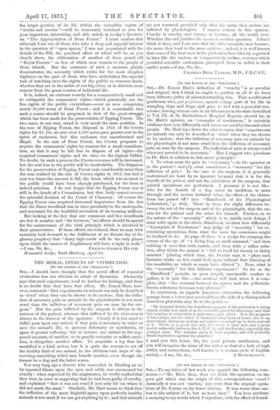[TO THE EDITOR OF THE "SPECTATOR:)
Sin,—Dr. Ernest Hart's definition of "cruelty" is so peculiar and original, that I think he ought to pardon us all if we have been hitherto guilty of misunderstanding him. That a cultivated gentleman who, par preference, spends a large part of his life in mangling dogs and frogs, and goes to bed with a peaceful con- science, leaving sixteen cats in his laboratory in the state described in Vol. IX. of St. Bartholomew Hospital Reports, should be, in Dr. Hart% opinion, an "exemplar of tenderness," is certainly evidence how very differently such terms are used by him and other people. Dr. Hart lays down the ethical canon that "experiments on animals can only be described as cruel' when they are shown to be useless ; that the infliction of necessary pain on animals by the physiologist is not more cruel than the infliction of necessary pain on man by the surgeon. The infliction of pain is always cruet when not proved to be necessary." May I suggest two questions to Dr. Hart in relation to this novel principle?
1. To whom must the pain be "necessary,"—to the operator or to the patient ? and (2), what constitutes a " necessity " for the infliction of pain ? In the case of the surgeon, it is generally understood (at least by us ignorant laymen) that it is for the benefit of the patient, and not the edification of the surgeon, that painful operations are performed. I presume it is not like- wise for the benefit of a dog when its backbone is sawn through, and the nerves irritated when the effect of the chloro- form has passed off ? (see " Handbook of the Physiological Laboratory," p. 403). There is, then, the slight difference be- tween the act of the surgeon and of the physiologist, that the one acts for the patient and the other for himself. Further, as to the nature of the " necessity " which is to justify such doings, I must refer again to the above Handbook, to show how differently "Exemplars of Tenderness" may judge of " necessity " for ex- cruciating operations, from what the mere lay conscience might be inclined to do. At page 39 there is a recipe for scraping the cornea of the eye of "a living frog or small mammal," and then rubbing it over first with caustic, and then with a saline solu- tion, after which the animal is "left to itself for twenty or thirty minutes" (during which time, the Doctor says, it "plays such fantastic tricks as few could look upon without that blunting of the sensibility on which so many have dilated "). Now, what is the "necessity" for this hideous experiment ? So far as the " Handbook " permits us poor stupid, unscientific readers to gather, it is just this :—the student will find, when it is com- plete, that "the contrast between the spaces and the yellowish- brown substance becomes very obvious ! "
In conclusion, as regards American vivisection the following passage from a letter just received from the wife of a distinguished American physician may be to the point :—
"My husband thinks the beneficent purpose of his profession is being almost wholly lost sight of in the scientific greed for discovery, and that this practice of vivisection is part cause, part effect. It is the progress of knowledge, not the relief of humanity they have at heart, and to my observation, enormous egotism and vanity are mixed up in their pursuit of it. There is a great hue and cry about it here now, and a great deal of animosity between the S. P. C. A. and the Faculty, especially the younger men. The humane party is very popular, and will probably obtain legislation against tho practice."
I send you this letter, Sir, for your private satisfaction, and you will recognise the name of the writer as that of a lady of high ability and connections, well known in a certain circle of English


































 Previous page
Previous page